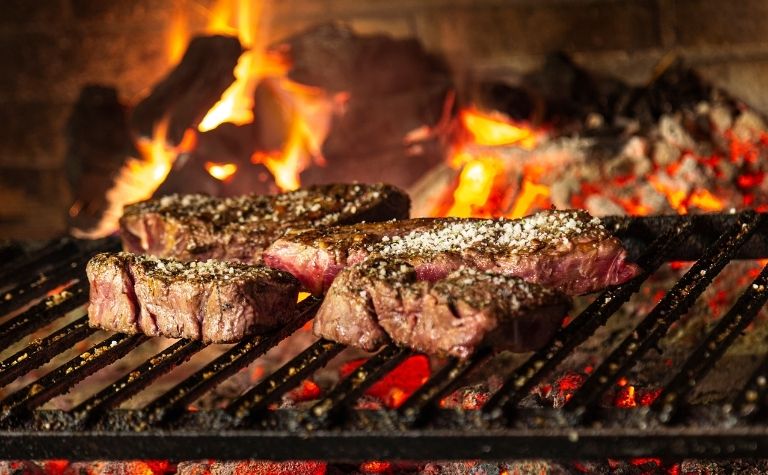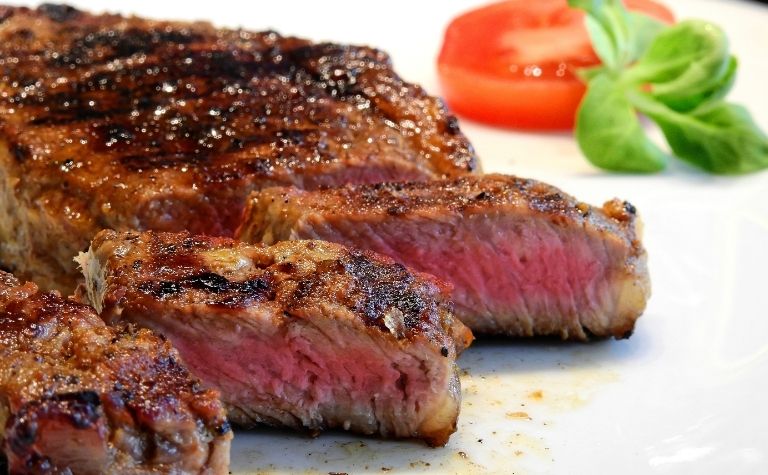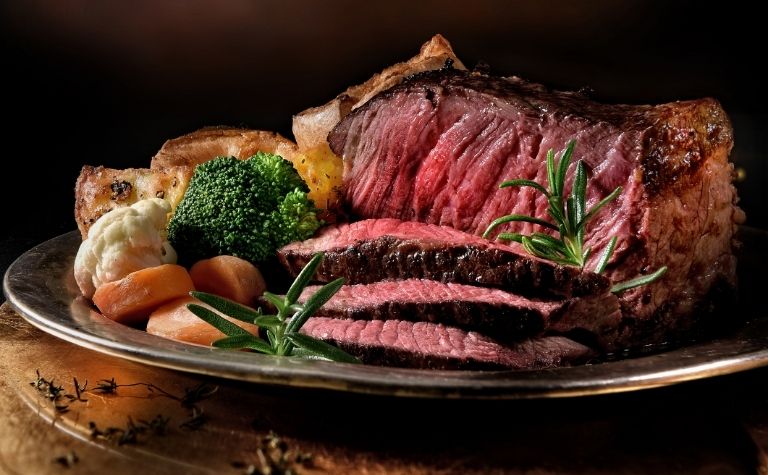Meat is a staple food in many cultures around the world. Red meat like beef and lamb, poultry like chicken and turkey, pork, which is meat from a pig, and seafood like fish and crab, are consumed often for breakfast, lunch, and dinner — and even snack time — all around the world. What does the Bible say about meat? Is eating the flesh of animals wrong?
Eating meat isn’t a sin, yet the Bible regulates it. For example, the Law forbids eating raw meat (Gen. 9:3-4) and Paul told Christians to consider their witness in eating meat in certain contexts (1 Cor. 8:13). Plant-based diets are permissible for Christians but aren’t a matter of obedience or disobedience.
Are some Christians vegetarians and vegans? Weren’t Adam and Eve vegetarians? Why did God forbid people from eating meat with blood in it? Can Roman Catholics eat meat on Fridays? Did Paul forbid Christians from eating meat? Keep reading to learn the answers to these questions and others.
Also see Is Overeating a Sin? to learn more.

Vegetarianism and Meat-Eating in the Bible
Some people feel strongly about not eating meat. They believe it’s more than just a dietary preference but a moral issue. Their conviction often centers upon not killing animals and not eating the flesh of another living creature. While not eating meat is an option for Christians, the moral argument for abstention conflicts with the Bible’s teaching that it is generally allowed.
Are some Christians vegetarians and vegans? Lots of Christians eat plant-based diets, but they do so because they have the freedom to according to the Bible, and often cite health benefits as their reason. Since the Bible doesn’t forbid eating meat in general, the Christian argument for plant-based diets isn’t (or shouldn’t be) built upon the idea that it violates God’s moral standards and is therefore sinful.
Weren’t Adam and Eve vegetarians? Yes, the first couple and their progeny only ate plants. God’s instructions about eating meat changed after the global flood in the days of Noah. Scholars note that God’s original instruction about what to eat doesn’t explicitly forbid eating meat. However, his instruction after the flood suggests to some that eating meat represented a dietary change.
Genesis 1:29-30 reads, “And God said, ‘Behold, I have given you every plant yielding seed that is on the face of all the earth, and every tree with seed in its fruit. You shall have them for food. And to every beast of the earth and to every bird of the heavens and to everything that creeps on the earth, everything that has the breath of life, I have given every green plant for food.’ And it was so.” (ESV)
After the flood, God gave people instructions about what to eat. In Genesis 9:2, God told Noah that animals had “the fear of you and the dread of you” (i.e. people). Scholars debate whether or not this represents a change. Did animals not fear people (or fear them less?) before the flood, suggesting, in part, that they were docile on the ark? The conversion among scholars is ongoing.
Whatever the answer, God clearly permits people to consume animals. Genesis 9:3-4 reads, “Every moving thing that lives shall be food for you. And as I gave you the green plants, I give you everything. But you shall not eat flesh with its life, that is, its blood.”
Also see Is Gossip a Sin? to learn more.

Why did God forbid people from eating meat with blood in it?
Genesis 9:4 restricted people from eating animals that were still alive, that is, with its “blood” (KJV, NKJV, NASB, ESV) or “lifeblood” (NIV, NLT, CSB) in it. In Hebrew, blood and life are directly connected, which is why some translations opt for the phrase “lifeblood” in the verse.
Verses like Leviticus 17:11 state this more directly: “the life of the flesh is in the blood.” This eventually led to the practice of draining the blood from animals (e.g. Deut. 12:23-25).
Even though God permits people to eat meat, the regulations he places upon it demonstrate the value of animal life. People’s dominion over animals isn’t permission to dominate them. One of the best Genesis commentaries explains that God intends people to steward animals, not abuse them.
“Animal life, though given to humanity for sustenance, remained valuable in the eyes of God as a living creature and therefore merited proper care, not wanton abuse. This privilege of killing animals for food assumed the responsibility of caring for animal life as it was first formulated in Eden (cf. 2:15). Disregard for the gift of life was an affront to the Giver of that life, for life was deemed ‘good’ as a creation edict.” [1]
Also see Is Anime Sinful? to learn more.

Can Roman Catholics eat meat?
Historically, the Roman Catholic Church has prohibited its members from eating meat on Fridays during Lent, which is the 40-day period prior to Easter. The reason for this restriction is because Jesus, who was flesh and blood, died on a Friday, so people shouldn’t eat animal flesh on that day. The Catholic Church permits the consumption of fish on these days, just not warm-blooded animals.
There is no biblical basis for not eating meat on Fridays during Lent. Nevertheless, the Catholic Church believes it’s a wise and important sacrifice for its members to make in order to enhance their observance of Good Friday and Easter.
The United States Conference of Catholic Bishops prohibits eating meat on certain days of Lent as well as Fridays during the 40-day period: “Wherefore, we ask, urgently and prayerfully, that we, as people of God, make of the entire Lenten Season a period of special penitential observance.” The instruction continues:
- Ash Wednesday and Good Friday: “Following the instructions of the Holy See, we declare that the obligation both to fast and to abstain from meat, an obligation observed under a more strict formality by our fathers in the faith, still binds on Ash Wednesday and Good Friday.”
- Fridays during Lent: “In keeping with the letter and spirit of Pope Paul’s Constitution Poenitemini, we preserved for our dioceses the tradition of abstinence from meat on each of the Fridays of Lent, confident that no Catholic Christian will lightly hold himself excused from this penitential practice.” [2]
Also see Does the Bible Say Fear Is Sinful? to learn more.
Did Paul teach that Christians shouldn’t eat meat?
A topic that caused significant disagreement among the first Christians regarded eating meat sacrificed to idols. While Paul writes that it may be wise in some contexts for Christians to refrain from eating meat, his instruction isn’t a general prohibition against the practice. Paul’s argument in 1 Corinthians 8:1-13 is outlined below.
- Correct knowledge and brotherly love are the guiding principles of this instruction: “Now concerning food offered to idols: we know that ‘all of us possess knowledge.’ This ‘knowledge’ puffs up, but love builds up. If anyone imagines that he knows something, he does not yet know as he ought to know. But if anyone loves God, he is known by God.” (8:1-3)
- The idols for which the meat was sacrificed are lifeless and empty: “Therefore, as to the eating of food offered to idols, we know that ‘an idol has no real existence,’ and that ‘there is no God but one.’ For although there may be so-called gods in heaven or on earth—as indeed there are many ‘gods’ and many ‘lords’— yet for us there is one God, the Father, from whom are all things and for whom we exist, and one Lord, Jesus Christ, through whom are all things and through whom we exist.” (8:4-6)
- Some Christians are less mature than others: “However, not all possess this knowledge. But some, through former association with idols, eat food as really offered to an idol, and their conscience, being weak, is defiled. Food will not commend us to God. We are no worse off if we do not eat, and no better off if we do.” (8:7-8)
- Consider younger believers: “But take care that this right of yours does not somehow become a stumbling block to the weak. For if anyone sees you who have knowledge eatingc in an idol’s temple, will he not be encouraged,d if his conscience is weak, to eat food offered to idols? And so by your knowledge this weak person is destroyed, the brother for whom Christ died.” (8:9-11)
- Making a young believer stumble is sinful: “Thus, sinning against your brotherse and wounding their conscience when it is weak, you sin against Christ. Therefore, if food makes my brother stumble, I will never eat meat, lest I make my brother stumble.” (8:12-13)
Bible verses about meat
- Genesis 9:3, “Every moving thing that lives shall be food for you. And as I gave you the green plants, I give you everything.”
- Romans 14:2, “One person believes he may eat anything, while the weak person eats only vegetables.”
- 1 Corinthians 8:3, “Therefore, if food makes my brother stumble, I will never eat meat, lest I make my brother stumble.”
- Romans 14:17, “For the kingdom of God is not a matter of eating and drinking but of righteousness and peace and joy in the Holy Spirit.”
- 1 Corinthians 10:31, “So, whether you eat or drink, or whatever you do, do all to the glory of God.”
Also see Is Saying Oh My God A Sin? to learn more.
References:
[1] Genesis 1-11:26 by Kenneth A Mathews. The New American Commentary. p. 402.
[2] Source
Related Articles
The Bible teaches that self-control is a fruit of the Holy Spirit (Gal. 5:23), which means that it's a characteristic that Christians should demonstrate and develop. All people, including Christians,...
1 John 5:16 makes a distinction between a sin that leads to death and a sin that doesn't. This description confuses some readers and troubles others. That there is a "sin that leads to death" raises...
